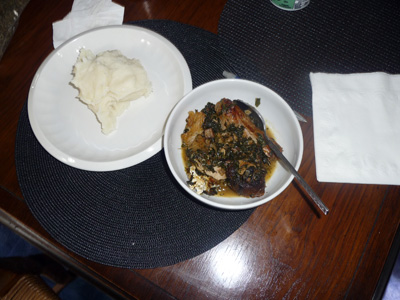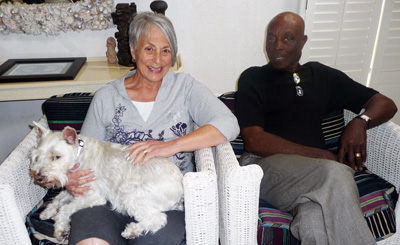
By Donald H. Harrison

SAN DIEGO – Okoronkwo Umeham, 73, has led a distinguished life in his native Nigeria; in the United Kingdom where he worked as a social worker; and finally in the United States, his country of citizenship, where he counsels troubled juveniles. Residents from the Eastern Nigerian village of Arochukwu, where he grew up, know him as an elder and mediator of villagers’ disputes as well as a contemporary and confidant of the region’s hereditary king. From his earnings, Umeham (Oooh-MAY-ham) supports four adults and pays the school fees for six students in Nigeria. Known for his kindness his whole life, Umeham has served as the elected president of the Arochukwu Association of Southern California. He is also considered an authority on the traditions and customs of his Igbo people.
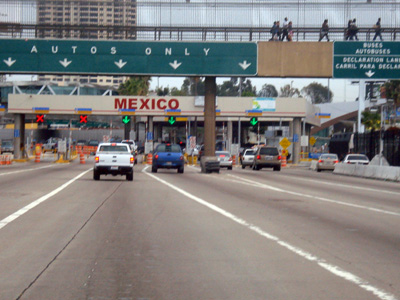 None of that mattered on Monday afternoon, March 15, when he crossed the Mexican border from San Diego to Tijuana. Mexican Marines manning the crossing inspected his packages in which he was carrying dried fish and various kinds of dried spices that are used to make a Nigerian soup known as Ugu—ingredients which he had planned to bring to a younger villager living in Tijuana who hungered for home cooking. Although the soup ingredients are legally sold in African markets in San Diego and Mexico City, the border guards assumed the worst – that Umeham was smuggling into the country marijuana, or khat, or some other sort of hallucinogenic drug.
None of that mattered on Monday afternoon, March 15, when he crossed the Mexican border from San Diego to Tijuana. Mexican Marines manning the crossing inspected his packages in which he was carrying dried fish and various kinds of dried spices that are used to make a Nigerian soup known as Ugu—ingredients which he had planned to bring to a younger villager living in Tijuana who hungered for home cooking. Although the soup ingredients are legally sold in African markets in San Diego and Mexico City, the border guards assumed the worst – that Umeham was smuggling into the country marijuana, or khat, or some other sort of hallucinogenic drug.
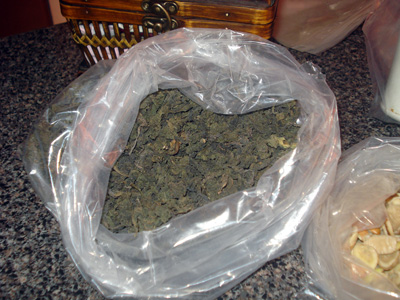
Two days later, after chemical tests proved that Umeham had told the truth—that he had brought nothing more dangerous from San Diego to Tijuana than some soup ingredients —he was allowed to return to the United States. But by then, reports had been carried in Mexican newspapers and on the Internet that he had been arrested for attempting to smuggle khat, a hallucinogenic, into Mexico. These reports besmirched the name of an honorable man. And to make matters worse, this distinguished African-born American had been slapped into handcuffs and shackles, and forced to painfully shuffle to and from interviews in a Mexican federal detention center like a slave brought to North America in the worst days of the 18th century slave trade.
Umeham is the husband of Gail Umeham, associate editor of San Diego Jewish World, and through 36 years of marriage to her, he is a man who has become well known in the San Diego Jewish community. His wife is a member of San Diego’s extended Feurzeig family, whose members through birth and marriage include San Diego National Bank founder Charles Feurzeig (her uncle American Israel Public Affairs Committee leader in San Diego, Leslie Caspi (her cousin) and Tifereth Israel Community Orchestra conductor David Amos (her cousin).
On March 18, the evening after he was released without so much as an apology from the Mexican authorities, the Umehams met with me, my wife Nancy, and with David and Lee Amos, and related what had happened to him. Anyone who travels into Mexico from the United States needs to become acquainted with his story, if for no other reason than similar outrages may befall them.
Living in Tijuana and engaged to be married there is Xavier Nnanna Nwafor, who in traditional Igbo fashion considers Okoronkwo (Oh-koh-RON-kwo) or “Mr. Okoronkwo” as he respectfully refers to him, to be his uncle, although the relationship is generational rather than of blood. The wife of Okoronkwo’s eldest brother is the sister of Nnanna’s father.
While ingredients for the African soup are readily attainable in San Diego, they are not available in Tijuana. Nnanna does not yet have an American visa, so he cannot come to San Diego to buy them. Nor is it possible on his limited income to fly to the next closest place where they are known to be available, Mexico City. So he asked Okoronkwo if he possibly could purchase the ingredients for him.
Okoronkwo took some to Nnanna last September without incident and kept some for himself at his home in San Diego. He still had ingredients left over last Monday, when Nnanna again had that craving for the spicy soup, which traditionally is soaked up and eaten with a handful of farina made from pounded yams.
Okoronkwo decided that he would drive to Tijuana, give the ingredients to Nnanna, and then return to San Diego. He had $544 in cash with him—money he intended to take to a Western Union office in San Diego to be sent to Nigeria for school fees. He expected to be back at his house in time to take their pet Schnauzer, Dandy, for an afternoon walk.
The ingredients that Okoronkwo packed into his recycled Trader Joe’s grocery bag were olugbu, ugu, uzaki, and oha. Olugbu is a type of grass that is washed and dried in the sun, and washed again to reduce the bitterness. Ugu, uzaki and oha are types of green vegetables that are also dried. To these vegetable bases are added three types of fish—cod, catfish and tilapia—as well as some thickeners known as ahi and ogbolo. Okoronkwo packed some of these ingredients in the original packages purchased from African Caribbean Food at 4811 El Cajon Blvd. Others he placed in Ziploc Bags.
He parked his car at a lot adjacent to the border and walked into Mexico through the turnstile. A few yards after entering Mexico, he came to a table with four Mexican Marine guards behind it. He presented his shoulder and grocery bags for what he assumed was routine inspection.
According to Okoronkwo: “They went for the olugbu—they said ‘what is this?’ I said ‘it is an ingredient for soup.’ They said, ‘Are you a hotelier?’ I said, ‘No, I am taking it to my nephew.” They said,’where is your nephew?’” Okoronkwo pointed down the pathway, to where it led into Tijuana. “I said ‘I can see him on the other side.’”
The Marines called an official who again questioned Okoronkwo. The official pantomimed someone smoking marijuana, saying that is what the ingredients looked like to him. Okoronkwo said he responded, “No, it is not; it is a vegetable, washed and dried.” The official asked, “ganja?” and Okoronkwo again answered in the negative.
Another official came, took a pinch of it, and lit it with a match. The burning odor was not that of marijuana. Eventually, the officials laid out all the bags and walked a sniffer dog past them. The dog was not interested in any of the ingredients. They had the dog make a second pass. Again, no reaction.
As the entry line behind Okoronkwo continued to back up, the Marines radioed for another dog, which arrived in the company of a full detachment of Mexican Marines commanded by an officer. The second dog showed no interest in the substance, but the officer put it to his nose and smelled it. He said something in Spanish that Okoronkwo thought meant “it isn’t anything” but to his surprise, some members of the detachment of Marines placed his arms behind him, tied his hands with plastic, pulled the belt from his pants, and went into his pockets, removing his $544, credit cards, reading glasses and a gold chain.
“Do I get a receipt?” he asked. “No,” they shook their heads. Then he was placed in the middle van of a caravan of three vehicles, with a guard flanking him on either side and a driver in the front. As they drove a distance to the federal holding facility known as the Procuraduría General de la República (PGR) he counted 14 soldiers in the vehicle in front of him. He couldn’t tell how many were in the rear vehicle.
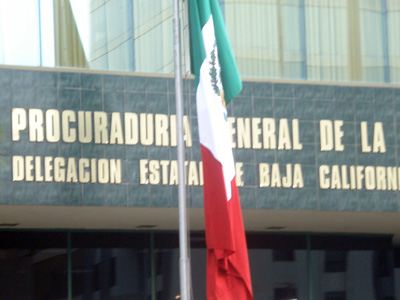
The PGR turned out to be a large building, and when the vans reached its parking lot, they effected a practiced maneuver. The Marines emerged from the first van to keep guard as Okoronkwo was directed to get out of the van. He already had his arms behind him, but now they fastened shackles to his legs so tightly that he winced in pain.
“I didn’t know how to walk with the shackles—I wanted to take a good stride—and I almost fell flat on my face, but they caught me,” Okoronkwo said. “And then I started shuffling, you know. And we went up the steps – I think it was the fourth or fifth floor—it took about 15 minutes before I could get up there, with shackles on my feet.”
Once upstairs, the Marines gave to the officials at the federal detention facility all the valuables that they had taken from Okoronkwo and soon departed. Prison guards took him to a cell measuring approximately eight feet by five feet. They removed the shackles and handcuffs, but the restraints were put back on him whenever he was taken from his cell.
“There was an internee in the cell when I arrived and he was up on top of the bunk,” Okoronkwo said. “The beds had no mattress, no bedding, no nothing. And the toilet was filled with feces. The whole area was smelly… And I sat down there and tears came down my face.”
**
Gail Umeham, meanwhile, had picked up two of her grandchildren at their schools and had played with them at Lake Murray, unaware that Okoronkwo was even missing. When her son, Arthur Lupsha, came in the late afternoon with his wife, Kelly, to collect the grandchildren, he asked Gail if she and Okoronkwo would like to go to a restaurant with them all for dinner. Gail told her son to call his Papa and ask him about dinner.
When she arrived at her San Carlos home approximately 6 p.m., Dandy barked a greeting to her at the door but Okoronkwo was not around. Perhaps, she thought, he went to the Kaiser Permanente Medical Center for a routine EKG. So she took Dandy for a long walk, returning about 7:30 p.m. The phone was ringing. It was Nnanna calling from Tijuana. He reported that Okoronkwo had failed to arrive for their scheduled meeting. Perhaps, Nnanna said, it had something to do with the change in American time to daylight savings time, perhaps Okoronkwo had come an hour earlier. Gail was surprised that Okoronkwo had gone to Tijuana. She told Nnanna she would ask Okoronkwo to call him as soon as he got home.
Gail did not become seriously worried until 9:30 p.m., still having heard no word from Okoronkwo. She telephoned my house, and I suggested that she call the non-emergency police number to see if they had heard about any accidents between the San Carlos neighborhood and the border. The police checked, there were no accidents, but in learning that Okoronkwo was 73 years old, and not in the habit of being away from home in the evening, they decided to send a policeman out to make a missing person report. Nancy and I decided to go over to Gail’s house to keep a vigil with her.
As we arrived, Gail was on the telephone. With great relief, we could hear that she was speaking with Okoronkwo. But the relief was momentary. She learned that he was in a Tijuana prison and that the authorities there thought he was carrying illegal drugs. The San Diego policeman arrived a few minutes later, and was glad to hear that Okoronkwo had been located in apparent good health. He gave to Gail a sheet with phone numbers that could be called in various circumstances. Included was the after-hours number for the U.S. Consulate in Tijuana.
**
Okoronkwo had remained seated on his bed in his prison cell until the night shift came in. He would not use the stinking toilet, and he refused tortillas and beans which had been brought to him. Food amid such an awful smell would have sickened him. Eventually, a guard came into the cell. The other inmate, who was approximately 45 years old, but, according to Okoronkwo “looked 75” was snoring, groaning and mumbling loudly in his sleep. The guard decided to move the man to another cell. Okoronkwo indicated the toilet with disgust, and the guard called in another man and the two of them cleaned it out. However, the stench remained.
About 10:30 p.m. he was re-shackled and brought from the cell to the detention facility offices, where he was motioned to sit down in front of the desk of Victor Flores. The room was a typical office, with approximately five desks, chairs, computers and from two to four other personnel at various times.
One of the men present appeared to be in his mid-twenties, and in broken English he told Okoronkwo that “what I brought into the country would be sent for testing and that they cannot hold me for more than 48 hours. The completion of the testing had to be done within 24 hours so they will know what is to be done.” The official also told Okoronkwo that he could get his own lawyer, or a government lawyer would represent him.
Okoronkwo told Flores he wanted to be able to tell Gail where he was, and Flores obliged by having an interpreter place a phone call to her. Okoronkwo told his wife about his situation, and, in answer to her question, acknowledged that he had not eaten. He also mentioned that he did not have his medications for high blood pressure or shoulder pain with him.
He then was taken back to his cell, but was returned to the administrator’s office on two occasions that night. One time was to meet with the public defender, who didn’t speak English. A new interpreter was found, and she told Okoronkwo that he should not make any statements to the prosecutor unless a lawyer was present, and that he had the choice of untilizing public defender or his own private lawyer.
The second time was to meet with Nnanna, who had persuaded a guard at the entrance to the facility to let him come up to speak with Okoronkwo even though it was after regular hours. When Nnanna saw Okoronkwo, his benefactor and distinguished elder of his village, in shackles and being pushed toward him, he cried to see such a man being so humiliated. Okoronkwo comforted Nnanna instead of vice versa. “Why do they have you chained; you are not a criminal!’ Nnanna exclaimed. “It is the way they do it here in Mexico,” said Okoronkwo. “Don’t worry, they will let me go within 48 hours.”
When Nnanna learned that Okoronkwo had not eaten anything, he volunteered to bring him some food from the outside. He went to an all-night restaurant and purchased a chicken sandwich, bottled water, and some salad, but he was not permitted to go back upstairs to bring the food to Okoronkwo. He persuaded a guard to have it delivered to the prisoner.
While this discussion was occurring, Rabbi Carlos Salas Diaz of Congregacion Hebrea de Baja California, his son Elias, who is an attorney, and a female member of the congregation who coincidentally is a staff member at the federal detention center, came to the facility to inquire after Okoronkwo.
I had telephoned Rabbi Salas Diaz approximately at 11 p.m. to tell him of our emergency and to explain that, while not Jewish himself, Okoronkwo was a member of a well-known Jewish family in San Diego. Rabbi Salas Diaz kindly offered to see what he could do.
On the approach of the rabbi and his entourage, the prison guard at the entrance told Nnanna to hide so that whoever was coming would not see that an unauthorized person was on the premises. Nnanna said he assumed the guards were concerned that the visitors might realize he was a Nigerian and probably there to see Okoronkwo.
Nnanna said he could not hear the conversation between the rabbi and the prison officials but estimated that his party spent about an hour at the facility. The rabbi was not given permission to see Okoronkwo directly, so he sent up his card, which was delivered to Okoronkwo as was the food purchased by Nnanna.
Okoronkwo protested that he could not eat the food in the foul atmosphere of his cell, so he was permitted—again while shackled—to eat in the administrator’s office. It was about 4:30 a.m. by the time he ate something.
In the meantime, a medical functionary came around to visit the prisoners and to ask if they had any problems which needed attending. There was a certain irony to this, because a similar position had been one of Okoronkwo’s earliest jobs in the United Kingdom as a social worker. Okoronkwo told the man that he took ibuprofen for his injured shoulder and also wrote down the name of his blood pressure medicine. The medications were delivered to him. Unwilling to sleep, Okoronkwo sat on his cot into Tuesday morning, March 16, until a guard shook his shoulder and said that a representative of the American consulate in Tijuana was waiting to interview him.
Again placed in shackles, Okoronkwo met a man who appeared to him to be between 35 and 40 years of age. He was Anglo with what seemed only a halting command of Spanish, and he seemed quite standoffish, a bureaucrat dispensing with a task without showing any interest or concern for Okoronkwo personally.
The man told Okoronkwo what the Mexican officials had already told him, that they were examining whether the contents of his bags were hallucinogenic and that they had to make a decision within 48 hours about what to do with him. The official told Okoronkwo that the Mexicans had a different system of justice than Americans, and that he should be very careful about what he said. Okoronkwo observed that as he doesn’t speak Spanish, he was unlikely to make any chance remark that might give offense. The consular official gave Okoronkwo a 26-page pamphlet outlining Mexican processes and suggested that he read it.
Mexico’s Criminal Justice System: A Guide for U.S. Citizens Arrested in Mexico contains an introduction, a short essay on key legal differences between the United States and Mexico, “Being Arrested in Mexico,” “Life Inside a Mexican Jail,” “How the State Department Can Help,” a List of Mexican criminal attorneys, a glossary, an explanation of the defendant’s Mexican constitutional rights, a place for notes and contact information.
About life inside the jail, it said: “Mexican jails usually do not provide all the amenities that U.S. jails do. Depending on how long you are going to be incarcerated, you should consider making arrangements with friends or family to have money, food and other necessities delivered to you. Many prisons supply only the very minimum necessities. In others, prisoners may have to purchase their own food, clothing, bedding and even pay rent on their cell. Although prison regulations require that prisoners have access to medical care, the standard of care varies widely….”
Okoronkwo said he told the consular official that his money and belongings had been confiscated, but no receipt had been given. The consular official told him not to expect one in Mexico, that likely he would never see the money again. But, in fact, the consular official would be proven wrong. All of Okoronkwo’s belongings were returned to him by the Mexicans, without a single thing being missing.
Okoronkwo told the consular official that he had left his car in the parking lot on the U.S. side of the border and expressed concern that the car should not be towed away in his absence. Again Okoronkwo asked for an opportunity to speak with his wife, and the consular official placed a call on his cell phone to her. Okoronkwo reassured Gail that he was okay. Gail asked the consular official to please call her as soon as Okoronkwo’s fate was learned, which he said he would. He didn’t. Nor did he ever contact Okoronkwo again about the car.
On the way out of the PGR, the consular official spotted Nnanna, and recognizing him as a Nigerian, asked if he was Okoronkwo’s nephew. Nnanna confirmed that he was, and the official gave him another copy of the pamphlet on Mexico’s Criminal Justice System.
Nnanna visited Okoronkwo during regular visiting hours on Tuesday, March 16, again bringing food. Okoronkwo, required to wear a prison vest, had his handcuffs so tight that he could not lift a water bottle to his lips. Nnanna had to hold the water bottle for his elder. Okoronkwo said he needed a toothbrush because he had not been able to brush his teeth since he was arrested. PGR officials, however, told Nnannna that toothbrushes were forbidden to prisoners.
**
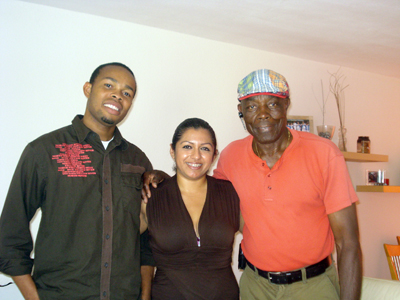
Nnanna’s fiancée, Cynthia Angelica Manzo Gonzales, accompanied Nnanna on his trips to the PGR although she waited outside. The couple had met on-line, while Nnanna was living in Mexico City. After a correspondence, she accepted an invitation to meet him there in December 2008. For Nnanna, Cynthia represents an instant family: she has a 13-year-old son, Christian. Her father, retired attorney Francisco Manzo Bedolla, is a retired corporate lawyer. After learning what had happened to Nnanna’s uncle, Bedolla contacted an attorney friend of his who specializes in criminal law, Julio Cesar Bustamantes Sanches.
Rabbi Salas Diaz meanwhile had telephoned Gail during the wee hours of Tuesday morning, but she had fallen into a fitful sleep. He left a message on her phone, expressing optimism that Okoronkwo would get out the following morning. At 7:30 a.m., he called again, still sounding optimistic. But at 10:30 a.m., when he made a third call to Gail, the rabbi sounded pessimistic. It was not long after that, that Okoronkwo called on the consular official’s phone. Reassuring Gail that he was physically unharmed, he said that he was waiting for the results of the chemical test on the soup ingredients to prove his innocence.
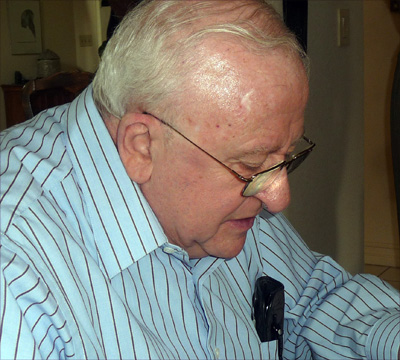
Concerned by what she perceived as the rabbi’s pessimism, Gail called her cousins, David and Lee Amos, to see if they could help. David, son of a Jewish emissary from British Mandatory Palestine to Mexico, was born in Mexico City, and moved with his family to Tijuana, where he operated an import-export business even while pursuing his career as a musician and symphony conductor. His romance with Gail’s first cousin, Lee, began when he realized that she was an accomplished musician.
With the Amoses now becoming involved, the number of phone calls to the offices at the Mexican federal detention center further increased beyond those being placed by Nnanna; his fiancée Cynthia’s family and lawyer friend; Gail; and Rabbi Salas-Diaz, son Elias Salas, and the detention center official who was a member of his congregation.
And to add to the concern being expressed from the American side of the border for Okoronkwo’s welfare, I sought help from the office of Congressman Bob Filner (Democrat-San Diego), whose district lies along California’s border with Mexico. Whether all this attention focused on Okoronkwo hurt or hindered him is hard to say, as will later be explained.
**
On Tuesday evening, March 16, Okoronkwo was questioned by Mexican federal officials. Where had he obtained the materials in the bag? He responded that the label was on the packets, that they came from the African-Caribbean Foods store. How much had he paid for each packet? He could not be sure, perhaps $2.90, at any rate, not very much. The prosecutor wanted to know when Okoronkwo had purchased the foods. He said it was about six months before, in September. The ingredients are dried and they do not spoil.
Okoronkwo said he was questioned several times to go over the same set of facts.
Otherwise, “nothing much happened until Wednesday,” he said.
**
That may have been true for Okoronkwo personally, but for the friends and friends of friends trying to help him, Tuesday night proved to be a night of excitement.
With all the emissaries contacting prison officials, different people were hearing different things from different sources. Nnanna said one person told him on Tuesday night that the chemical tests had shown Okoronkwo had not brought any hallucinogenic materials into the country. However, the paper work to release him would take some time—but it could be given priority—if a fee were paid. Nnanna said the person told him $1,500 would be required, which he refused to pay.
Meanwhile, Elias Salas, the son of the rabbi, said he was advised, around 11 PM Tuesday, by an official that Okoronkwo’s problems could be made to go away, but doing so would cost $5,000 cash to be delivered that very night in a Tijuana parking lot. Elias passed this information onto David Amos. They agreed that such an arrangement was out of the question.
I wondered whether by our sheer persistence and by the clamor that we had engendered we had inadvertently encouraged some officials at the holding facility to seek to extort money from us. Obviously, if so many people cared about Okoronkwo, he was well-connected. And, if he was well-connected, maybe these friends had money to pay….
With such concern, I telephoned a member of the U.S. Attorney’s staff of my acquaintance and explained the situation. The official said that there is a lot of corruption in Mexico, but there is nothing that the U.S. Attorney’s office can do about it. I asked if Americans would be violating U.S. law if they acceded to such extortion. The official did not answer me directly, but repeated that the U.S. has no jurisdiction over what happens in Mexico.
During the discussion, the official said that there has been a lot of movement of money and drugs across the border—both northbound and southbound—in the wake of the arrests and prosecution of some major Mexican drug cartel officials. I expressed surprise that anyone was accused of smuggling drugs into Mexico, but the official said those involved in the drug trade sometimes feel a need to reposition their assets. It was possible, according to the official, that Okoronkwo attracted suspicion because he is of Nigerian birth, because people from that country have been used as “mules.”
In fact, said my source, in the mixed-up world of drug trafficking, the least suspicious can be the most suspicious. Cartels recruit or blackmail the least likely looking people to become drug smugglers – octogenarians in wheel chairs, pretty young girls, just about anyone.
In such an environment, Okoronkwo’s story that he was simply bringing soup ingredients to his nephew was bound to be greeted with cynicism.
**
On Wednesday morning, March 17, while much of the rest of the world was beginning to celebrate St. Patrick’s Day, Okoronkwo was brought to a larger office than the one he had been taken to before. When he complained about the shackles on his legs being painful, they were removed, although the handcuffs were kept in place. This more favorable treatment augured good news: The chemical tests on the soup ingredients had come back and Okoronkwo would be released later in the day, possibly in two hours. They still were waiting for tests on the dried fish, he was told.
About an hour and a half later, accompanied now by the public defender, Okoronkwo was presented with a written document concerning his case, which he was asked to sign. After it was translated to him, Okoronkwo said there was a mistake within it. One sentence said that he had prepared the ingredients in the bags, whereas he had purchased them. This required the document to be retyped, causing a delay in his release. When the retyped documents came, Okoronkwo’s handcuffs were removed to enable him to sign them, and then were put back on him. The public defender, saying Okoronkwo soon would be freed, announced he would be leaving, not to see him again.
In San Diego, meanwhile, not hearing anything about Okoronkwo, David Amos, arranged for yet another attorney, Alejandro Zamudio Quiros, to look into Okoronkwo’s case. The contact was made through an attorney who had represented Amos’s import-export company, in much the same way as Nnanna had secured a criminal attorney, Zamudio’s office being near the federal detention facility, he was able to promptly talk with officials there.
Eventually, Okoronkwo was given back his bags—with all the contents including the money still intact—and six policemen escorted him in a van to another facility in another part of Tijuana. He briefly met with Nnanna outside the facility, giving him his bags to hold onto, including the Nigerian soup ingredients. When Nnanna heard where Okoronkwo was being taken to next, he became quite concerned because it is a place from which people are deported from Tijuana. Nnanna feared Okoronkwo’s passport would be stamped with a notice of deportation, even though he had done nothing wrong. Such a stamp would have prevented Okoronkwo from returning to Tijuana, not even to attend Nnanna’s wedding to Cynthia, planned later this year. Attorney Zamudio assured him that no restrictions would be stamped onto the passport, that this should not be cause for concern.
At the second facility, Okoronkwo had his restraints removed and he was ushered into a common hall where there were people of various ethnicities, including Japanese, Chinese, as well as some women in various states of undress, whom he assumed were prostitutes. He sat against the wall on a mattress and waited for the next step in the lengthy release procedure.
When it was time to be transported to the border, once again, he was shackled, even though he was being freed. Such is standard procedure in Mexico. Okoronkwo passed through the U.S. building at the border without further incident, but after crossing over to the U.S. side, he realized that there was no way for him to go to the McDonald’s restaurant on the Mexican side of the border, where he had planned to meet Nnanna to reclaim his shoulder bag, money and personal possessions.
He decided he did not want to return to the original turnstile gate where his misadventure started, so he called Gail and asked her to telephone Nnanna in Tijuana to tell him they would arrange to retrieve his bag on another day. As it turned out, Cynthia brought it to him in San Diego just this weekend.
*
Although Okoronkwo complained about the shackles and the filthy cell at the PGR—conditions which all prisoners there must endure—he said he had no complaints against any of the authorities or guards with whom he personally came into contact. He was never harassed, threatened, or in any way made to feel insecure, he said. Procedures were explained to him, and followed. Although he never received a receipt when his belongings were taken, nevertheless they were returned to him intact.
So, there was adherence to the law inside of the building, even as on the outside, payments were sought from people who wanted to speed up the process. On the one hand, the justice system worked as designed; on the other, it was corrupted.
Did all the phone calls in Okoronkwo’s behalf help or hinder him? Was he kept there longer by people who wanted to milk his supporters for bribes, or were those seeking bribes simply opportunists who understood far better than any outsider what the process was?
From the accounts of both Gail and Okoronkwo, we can see that the performance of the U.S. consulate’s office was perfunctory. At one point, an official in the consulate told a representative of Congressman Filner’s office that Okoronkwo had drugs, which he didn’t, but might get off. Apparently, the consular official didn’t bother to even ascertain what really had happened to this distinguished American citizen.
*
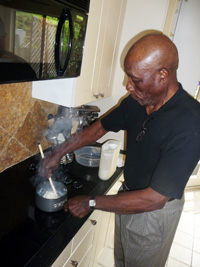 The entire episode left the Umehams and their friends with a profound distrust for the Mexican justice system, yet with affection and appreciation for all the people on both sides of the border who did their best to intervene in his behalf. As for me, I couldn’t wait to taste the soup that Nnanna had so craved. Okoronkwo obliged by cooking it on Sunday, March 21, at his home. It is really tasty, but not worth the price of going to a Mexican jail.
The entire episode left the Umehams and their friends with a profound distrust for the Mexican justice system, yet with affection and appreciation for all the people on both sides of the border who did their best to intervene in his behalf. As for me, I couldn’t wait to taste the soup that Nnanna had so craved. Okoronkwo obliged by cooking it on Sunday, March 21, at his home. It is really tasty, but not worth the price of going to a Mexican jail.
*
Harrison is editor of San Diego Jewish World. Photos by Harrison and by Cynthia Manzo.
